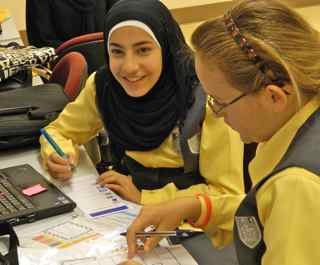Stranger Danger – a misnomer?
Posted: November 14, 2014 Filed under: Uncategorized 3 CommentsRecently, there have been some unfortunate situations in Switzerland where children have been approached by strangers. It raises the question of how to approach conversations with children on this topic.
More often than not, our kids are at greater risk from people we know and trust. Yes, it’s true that some strangers are dangerous. But our kids have to interact with strangers all the time – be it a bus driver, shop assistant or someone friendly looking to chat. It is unrealistic to villainise all strangers. To teach our children to beware of all strangers may not only frighten them, but may go against them at a time when they might otherwise need that stranger’s help. Black and white rules about stranger danger can be confusing.
Here are five things to teach your children about strangers that we reinforce at school:
- Most strangers are good people, but that doesn’t mean we should be too trusting.
- If you are ever approached by a stranger, always check with your parents before doing anything with that stranger.
- If you are going somewhere with a stranger (for some unanticipated reason), always stay in public.
- There may be some instances, perhaps if you got lost or needed help, where you need to go to a stranger. If you do need to talk to a stranger, it’s always best to look for a mum with children and ask her for help.
- If you ever feel unsafe, like a stranger is following you, find another adult and explain what you are scared of. Because most strangers are safe, if you ask for help you’re very likely to get it. But if you are invited into someone’s house, always say no and just stay on the doorstep.
When conversations with students arise on this issue, we try to teach a few commonsense rules about strangers:
- If you feel unsafe, move away from strangers.
- If a stranger promises you something cool, like lollies, games, or butterflies, lizards, snakes, or whatever, say no and move away.
- If a stranger (or any adult) ever grabs you or touches you in a way that makes you scared, scream the following words: “Stop it! Help! Don’t touch me!” And scream them LOUD!
But what about people we know?
Based on the statistics, the tricky teaching needs to be around keeping our kids safe from people we know and trust. The wisest approach to this is to tell children:
- My body is mine.
- No one should ever, ever touch the private parts of my body.
- If anyone tries to touch me, I should loudly say “Stop it! Help! Don’t touch me!”.
- If a person tells me to keep a secret that relates to private parts of my body, I should remember that they’re wrong. I should tell my mum or dad immediately.
- If a person says anything to me or does anything to me (or my body) that leaves me feeling bad, yucky, or guilty, I should tell my parents – even if I’m scared about it.
Children need our protection, and we need to work together to ensure their safety. One of the best ways to protect our children is to educate them. However, we must remember that these lessons are not taught in a single conversation ….they must be reinforced, on-going and relevant.
Scott Jackson
ISBerne Principal




Thanks for this article – very helpful and we appreciate that you make this a topic at school too!
Thanks for covering this.
“If a person tells me to keep a secret that relates to private parts of my body, I should remember that they’re wrong. I should tell my mum immediately.”
They could also tell their dad.
Good catch Martel. It has been corrected. Thanks for your feedback Martel & Ute.